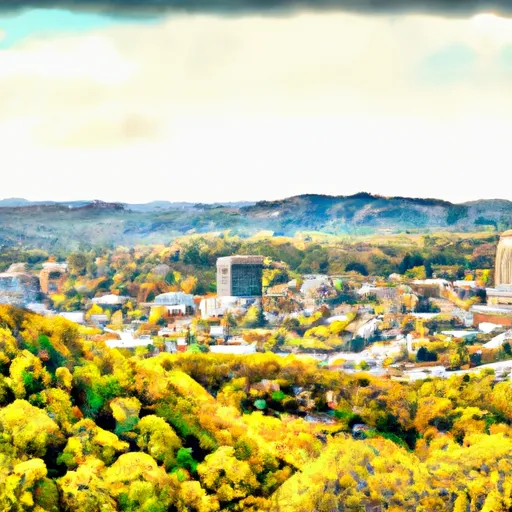-
 Snoflo Premium
Snoflo Premium
Get unlimited access to all our content
With no Ad interruptions! - Start Your Free Trial Login with existing account
Lookout-Mountain
Eden Index
Climate
7.7
•
Recreation
5.2
•
Community
4.2
•
Safeguard
5.9/10

Lookout Mountain, Georgia is a beautiful destination that offers a diverse range of outdoor recreation opportunities, thanks to its unique climate, hydrology constituents, and natural attractions.
The climate in Lookout Mountain is generally mild, with warm summers and cool winters. The mountainous terrain creates a microclimate, resulting in cooler temperatures and increased precipitation compared to surrounding areas. This contributes to the area's lush vegetation and scenic beauty.
Hydrology constituents in Lookout Mountain are abundant, with several streams, creeks, and waterfalls dotting the landscape. These water features provide opportunities for activities like fishing, canoeing, and kayaking. One notable hydrological attraction is the majestic Lookout Mountain Falls, which captivates visitors with its cascading beauty.
Outdoor recreation opportunities are plentiful in Lookout Mountain. Hiking and mountain biking trails offer adventurers the chance to explore the mountainous terrain and enjoy stunning vistas. Rock climbing enthusiasts can test their skills on the rugged cliffs. Lookout Mountain is also home to several state parks and nature preserves, providing ample opportunities for camping, picnicking, and wildlife spotting. Overall, Lookout Mountain, Georgia is a haven for outdoor enthusiasts seeking to immerse themselves in nature's beauty and engage in a variety of recreational activities.
What is the Eden Index?
The Snoflo Eden Index serves as a comprehensive rating system for regions, evaluating their desirability through a holistic assessment of climate health, outdoor recreation opportunities, and natural disaster risk, acknowledging the profound impact of these factors on livability and well-being.
Climate Health Indicator (CHI): 7.7
Lookout-Mountain receives approximately
1370mm of rain per year,
with humidity levels near 85%
and air temperatures averaging around
15°C.
Lookout-Mountain has a plant hardyness factor of
7, meaning
plants and agriculture in this region tend to thrive during the non-winter months.
By considering the ideal temperature range, reliable water supplies, clean air, and stable seasonal rain or snowpacks, the Climate Health Indicator (CHI) underscores the significance of a healthy climate as the foundation for quality living.
A healthy climate is paramount for ensuring a high quality of life and livability in a region, fostering both physical well-being and environmental harmony. This can be characterized by ideal temperatures, reliable access to water supplies, clean air, and consistent seasonal rain or snowpacks.
Weather Forecast
Streamflow Conditions
Middle Tennessee-Hiwassee
Area Rivers
Middle Tennessee-Hiwassee
Snowpack Depths
Middle Tennessee-Hiwassee
Reservoir Storage Capacity
Middle Tennessee-Hiwassee
Groundwater Levels
Recreational Opportunity Index (ROI): 5.2
The Recreational Opportunity Index (ROI) recognizes the value of outdoor recreational options, such as parks, hiking trails, camping sites, and fishing spots, while acknowledging that climate plays a pivotal role in ensuring the comfort and consistency of these experiences.
Access to outdoor recreational opportunities, encompassing activities such as parks, hiking, camping, and fishing, is crucial for overall well-being, and the climate plays a pivotal role in enabling and enhancing these experiences, ensuring that individuals can engage in nature-based activities comfortably and consistently.
Camping Areas
| Campground | Campsites | Reservations | Toilets | Showers | Elevation |
|---|---|---|---|---|---|
| Spring Villa Campground | 24 | 604 ft | |||
| Chewacla State Park | None | 516 ft | |||
| R Shaefer Heard | None | 640 ft | |||
| Tally Valley County Park | None | 1,117 ft | |||
| John Tanner State Park | None | 1,094 ft | |||
| Burnt Village | 120 | 687 ft | |||
| Whitetail Ridge | None | 694 ft | |||
| Amity | None | 689 ft | |||
| Pyne Road Park | 24 | 711 ft | |||
| Big Oak Gap Hunter Camp | 10 | 1,404 ft |
Nearby Fishing
Nearby Ski Areas
Catastrophe Safeguard Index (CSI):
The Catastrophe Safeguard Index (CSI) recognizes that natural disaster risk, encompassing floods, fires, hurricanes, and tornadoes, can drastically affect safety and the overall appeal of an area.
The level of natural disaster risk in a region significantly affects safety and the overall livability, with climate change amplifying these risks by potentially increasing the frequency and intensity of events like floods, fires, hurricanes, and tornadoes, thereby posing substantial challenges to community resilience and well-being.
Community Resilience Indicator (CRI): 4.2
The Community Resilience Indicator (CRI) recognizes that education, healthcare, and socioeconomics are crucial to the well-being of a region. The CRI acknowledges the profound impact of these elements on residents' overall quality of life. By evaluating educational resources, healthcare accessibility, and economic inclusivity, the index captures the essential aspects that contribute to a thriving community, fostering resident satisfaction, equity, and social cohesion.

